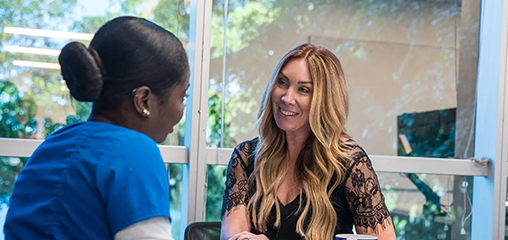
When juggling your nursing school applications, clinical schedules, and heavy workload from your classes, the last thing you want is for your financial aid application to get delayed due to an easy-to-avoid error. Unfortunately, FAFSA mistakes are more common than you may think, and can even slow down the entire process of getting your nursing school financial aid approved.
“Whether you are applying for the first time or renewing your FAFSA, understanding how to avoid FAFSA application errors and knowing which are the most common can make a huge difference in how quickly you receive your aid and how much you may qualify for,” said Jeff Akens, Senior Vice President of Operations at Arizona College of Nursing.
We will walk through some of the most common FAFSA mistakes nursing students make, how to fix them, and the key FAFSA tricks every nursing student should know.
Why does the FAFSA matter for your nursing education?

The Free Application for Federal Student Aid (FAFSA) is your gateway to most types of financial aid. This includes things like federal grants, loans, work-study programs, and is often required for state and institutional aid, scholarships, and other special programs. Many nursing schools use data from FAFSA to determine how much each student should get regarding scholarships or state aid, meaning that completing it on time and accurately is your first key to success. Making sure that your FAFSA is error-free helps ensure that you get the financial support you need to focus on your studies.
Filling out your application correctly can also help protect your return on investment as a future nurse. Nursing schools are a valuable and educational investment, but they are also a significant financial commitment. The less that you owe post-graduation, the more freedom you’ll have to pursue advanced certifications, choose the nursing specialty you love, or even return to school later to earn a higher degree.
When should you apply for financial aid?
The FAFSA opens each year on October 1, and the earlier you complete it, the better. Your financial aid application determines your eligibility for grants, loans, and work-study funds, many of which are given out on a first-come, first-served basis. Submitting your FAFSA early will give you the best chance of receiving the maximum amount of nursing school financial aid available to you.
Notably, the FAFSA utilizes prior-prior year tax information, which means that you will report income data from 2 years before the academic year you are applying for. For example, the 2024-2025 FAFSA uses 2022 tax information, allowing you to complete your FAFSA right when it opens, without waiting for new tax returns.
By applying as early as possible and using accurate prior-prior year tax data, you will avoid any last-minute stress and be able to catch any FAFSA mistakes with plenty of spare time.
Should you complete the FAFSA online?

While you are technically able to submit a paper FAFSA, completing your financial aid application online is the fastest and most reliable option. The online application includes built-in error-checking tools that flag common FAFSA mistakes. This includes information such as invalid characters, missing signatures, and incorrect social security numbers. If errors are found, the system on the website prompts the user to correct the information before moving to another section, making it a great tool in the financial aid process. You will also have access to a Save and Return feature, which allows you to start your FAFSA, save your progress, and come back without losing any data.
Before you begin, both the student and a parent (if you are a dependent student) must create a FAFSA ID. This ID acts as your digital signature and is what allows you to access Federal Student Aid websites and complete your FAFSA application online. Setting this ID up early prevents last-minute submission issues and will allow you to sign FAFSA forms electronically with no printing or mailing necessary.
Typically, online submissions are processed within just a few days compared to weeks for paper applications. Applying online is faster, safer, and far less prone to errors or mailing delays, making it more likely for your nursing school financial aid to be awarded sooner.
What are the most common data entry mistakes?
When it comes to your financial aid application, accuracy is everything. Typos, incorrect social security numbers, or swapped parent/student income information or birthdates can hold up your nursing school financial aid package. When entering numbers, it is crucial to never leave a space blank. Instead, use “0” if the answer is zero or N/A if a question is non-applicable and truly does not apply to you. Leaving fields blank or failing to use the correct codes is just another chance for you to hit issues with your FAFSA submission or lead you to processing delays.
Another common mistake students make when filling out the FAFSA is understanding the difference between the student and parent sections. Double-check that all income and student assets are reported under the student’s name to capture the correct financial information and make sure that all demographic information is under the correct name.
Before you begin your FAFSA, check your federal student loan status. If you have previous federal student loans that went into default after the COVID-19 payment pause ended, you may be blocked from receiving federal financial aid. This affects both grants and loans. If you’re unsure about your loan status, contact your loan servicer to resolve any issues before submitting your FAFSA.
The FAFSA application also provides specific definitions and guidelines about dependency status, household size, and marital status of parents. If you are a dependent student, your parents’ information must be included, even if they do not plan to contribute financially. FAFSA defines dependency based on many factors, but whether your parents help pay for school is not one of them. Taking the extra time to review each entry can prevent delays, verification requests, and other headaches down the line.
Critical FAFSA Requirements You Can’t Miss

Certain parts of your financial aid application carry extra weight and missing them can lead to major FAFSA mistakes or processing delays. One of the most important is your student status and dependency declaration. FAFSA uses your answers about age, marital status, military service, and dependents to determine whether you must include parent information. Many students mistakenly mark themselves as independent when they are not, which can cause verification of holds or reduced eligibility. Always review the dependency questions carefully to ensure you are answering based on FAFSA definitions and not just personal assumptions.
Next, double-check your school selection process. You can list up to 20 colleges or universities, and each school you include will receive your FAFSA data to determine your nursing school financial aid eligibility. Missing or incorrect school codes are one of the most common reasons students never receive their aid offers on time.
Another area where it is critical to report accurately is in income and asset reporting. When completing your FAFSA use the embedded IRS Data Retrieval Tool to ensure accurate information is reported. No need to interpret complicated taxes when you can simply import the data. Make sure you include the correct figures for savings, checking accounts, and investments under the right person (student vs parent). FAFSA uses these numbers to calculate your Student Aid Index (SAI), which directly affects how much aid you can receive. Mistakes here can lead to under-awarding or even an audit of your financial aid file.
The FAFSA needs to be completed every year. Many students get through the process their first year, just to have issues or delays as a sophomore. Put an annual reminder each October to complete the next year’s FAFSA and do a friendly check-in with your Financial Aid Officer. We love it when our students stop by to proactively check in.
Finally, don’t panic if you realize that something needs to be corrected before or after submitting your application. FAFSA allows you to make corrections online! Log back into your application, update the fields, and resubmit. The faster you correct these errors, the faster your application can be processed.
Where can you get help with your FAFSA?

Even with the best FAFSA tips and tricks, the process can be confusing and leave you feeling overwhelmed, especially if it is your first time filling out a financial aid application. The good news is you do not have to go through it alone! At Arizona College of Nursing, there are plenty of free, trustworthy resources that can help you get your nursing school financial aid right the first time through.
“At Arizona College of Nursing, students can reach out directly to the Financial Aid Office for one-on-one support. The team can help you determine your dependency status, understand which parent information to include, and verify that your FAFSA has been processed correctly,” added Akens.
The team at Arizona College of Nursing can also offer guidance on how your financial aid package applies to tuition, fees, and clinical costs, and connect you with your own Financial Aid Officer to discuss financing options for you and your selected program. With this guidance, you will know exactly what to expect before classes start.
You can also find FAFSA help resources through studentaid.gov. Here, you can chat live with Federal Student Aid representatives, access video tutorials, or call the FAFSA information center for personalized assistance. Local community organizations and high schools often host FAFSA completion events as well, which is perfect for students who prefer in-person help.
Arizona College of Nursing’s Financial Aid Team is your partner in all things Financial Aid. If you are confused, unsure, or something appears off, it is important that you contact your school or the Financial Aid Office right away. Early communication can prevent delays and help you correct any FAFSA mistakes before they impact your funding.
Remember, asking for help is a part of being proactive about your future as a nurse. Completing your FAFSA accurately and on time is one of the first steps toward building a strong foundation for your education and your career.
Start Your Future in Nursing Today

If you’re considering a career as a registered nurse (RN), Arizona College of Nursing is here to help you pursue your dream. Our BSN program enables you to earn a Bachelor of Science in Nursing in just 3 years or less with qualifying transfer credits. We’ve helped hundreds of students to earn a BSN degree and enter the nursing profession – and we’re ready to support you on your path to becoming an RN.
Why Choose Arizona College of Nursing?
- Earn a BSN degree in 3 years or less with eligible transfer credits
- Campus locations throughout the US
- Night classes for general education courses
- Hybrid Online/In-Person format for general education classes
- Nursing education is all we do
- CCNE-Accredited Program*
- NCLEX-RN success coaches and exam preparation class
- Financial aid available to those who qualify
Discover Your Path to a Career in Nursing
Information in this post is accurate as of November 17, 2025.
*The Bachelor of Science in Nursing (BSN) degree program at Arizona College of Nursing is accredited by the Commission on Collegiate Nursing Education (https://www.aacnnursing.org/). All Arizona College of Nursing and Arizona College campuses are institutionally accredited by the Accrediting Bureau of Health Education Schools (https://www.abhes.org/), a U.S. Department of Education-recognized accrediting agency.








